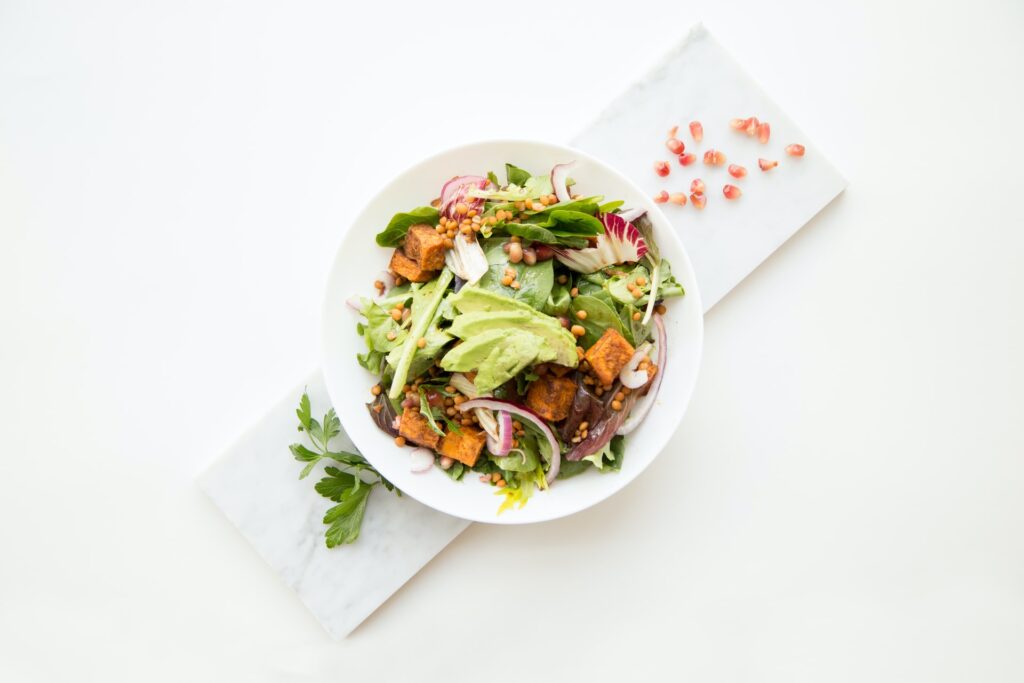What is veganism?
According to Wikipedia(1), „Veganism is the practice of abstaining from the use of animal products, particularly in diet, and an associated philosophy that rejects the commodity status of animals.”
What do vegans eat?
The vegan diet excludes all products that come from animals, including milk, eggs, their derivatives and others. The vegan diet also excludes the use of animal oils, such as beef tallow or lard, therefore some soups have to be prepared strictly to be suitable for vegans. Such a diet, similarly to a vegetarian diet, comes with some advantages and disadvantages. Before discussing potential difficulties associated with veganism, I will first explain the pros and cons of veganism to ensure that the topic is deeply understood.
Vegan diet advantages and disadvantages
The pros and cons of a vegan diet are listed below(1,2,3,4,5):
Benefits of vegan diet:
- Vegan diets tend to be higher in dietary fibre, magnesium, folic acid, vitamin A, vitamin C, vitamin E, iron and phytochemicals
- Vegan diets tend to be lower in dietary energy, which reduces the risk of developing obesity, insulin resistance, type 2 diabetes and cardiovascular diseases
- Such diets are typically lower in saturated fats, which further favours lipid profile and decreases the risk of developing insulin resistance, obesity and cardiovascular diseases
- Vegans usually tend to eat more vegetables and fruits, which are sources of antioxidants and polyphenols
- It has the potential to lower blood sugar levels
- It may protect against certain types of cancer
- It has the potential to lower the pain from arthritis
Cons of the vegan diet:
- Vegan diets are usually lower in omega-3 fatty acids
- Vegans may also struggle to provide enough of some micronutrients, such as zinc, vitamin D, calcium and vitamin B12, which puts them at risk of malnutrition, while it is important to note that chronic vitamin B12 deficiency can lead to irreversible effects if left untreated
- It can be unsustainable for some individuals as it’s very restrictive and it may result in moving back to previous, unhealthy eating patterns
- It requires certain knowledge to be followed safely, especially in cases of pregnancy, breastfeeding or nutrition-related conditions
- It can be challenging to provide enough protein, especially for athletes, on a vegan diet
As it’s commonly known all foods contain both macronutrients and micronutrients. Macronutrients fuel our body with energy (that comes from carbohydrates and fats) and protein (which are building blocks for the tissues within our bodies). Micronutrients include vitamins and minerals, some of which are essential (which means our body is incapable of producing them on its own and they have to be delivered from food). Some of the micronutrients can be found in sufficient quantities only in animal products, therefore eliminating all animal products might cause providing certain micronutrients more difficult.
Vegan diets typically make it much harder to provide enough iron, zinc, vitamin D, calcium, omega-3 fatty acids and vitamin B12. These micronutrients can, of course, be provided with alternatives to animal products, however, some nutrients, such as vitamin B12 can only be found in fortified products, such as fortified drinks (soy drinks, rice drinks, almond drinks, etc.) or in vegan supplements. Another difficulty that comes with a vegan diet is providing adequate amounts of micronutrients from supplements, as the supplements have to be prepared strictly to be suitable for vegans. The difficulties that come with vegan diets are related to providing enough of what the body needs, mainly because it’s very hard to find certain micronutrients or even macronutrients in plant alternatives. Another example could be protein. As we know, protein can be also found in soy (or other legumes like chickpeas, beans, pea or lentils), quinoa, linseed, chia, other nuts and seeds and a couple of other products. The problem is that products such as quinoa or legumes are also very high in carbohydrates and it will be a struggle to provide enough protein for an athlete from a vegan diet. They can use vegan protein supplements, but some proteins, such as pea protein might cause bloating and gas if consumed in excessive amounts. Another important fact is that plant-based protein is usually lower in leucine content or other amino acids, which causes the muscle protein synthesis upon consumption of such products to be lower. Another drawback is soy. Soy is very high in protein, cheap and very common. As its price is low and it’s easy to find, a lot of vegan products are very rich in soy, which can increase the risk of developing food allergies and intolerances through overconsumption of them. These are not the only drawbacks of vegan diets. It’s important to remember that breastfeeding and pregnant women additional calories and certain micronutrients in larger quantities (for example vitamin D) and might be detrimental to the baby’s (or fetus’) health if they are not provided in adequate amounts.
References:
- Wikipedia, Veganism, accessed on 26/06/21, available at: https://en.wikipedia.org/wiki/Veganism
- Kathy W. Warwick(2021), 6 Science-Based Health Benefits of Eating Vegan, accessed on 26/06/21, available at: https://www.healthline.com/nutrition/vegan-diet-benefits
- NHS, The Vegan Diet, accessed on 26/06/21, available at: https://www.nhs.uk/live-well/eat-well/the-vegan-diet/
- BMI Healthcare, The pros and cons of a vegan diet, accessed on 26/06/21, available at: https://www.bmihealthcare.co.uk/health-matters/health-and-wellbeing/the-pros-and-cons-of-a-vegan-diet
- Janaki Jitchotvisut(2019), 5 potential drawbacks of following a vegan diet, accessed on 26/06/21, available at: https://www.insider.com/the-potential-risks-of-being-vegan-2019-4




